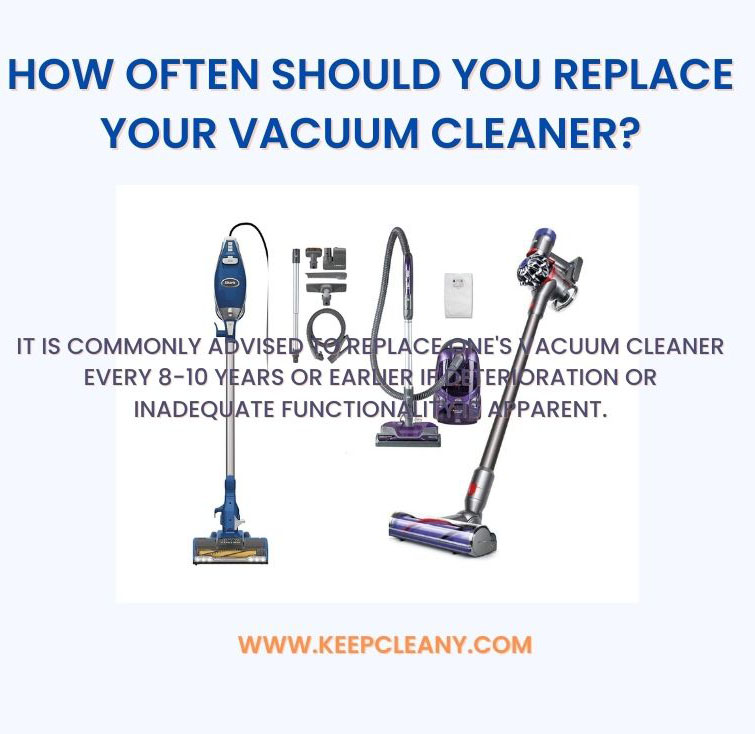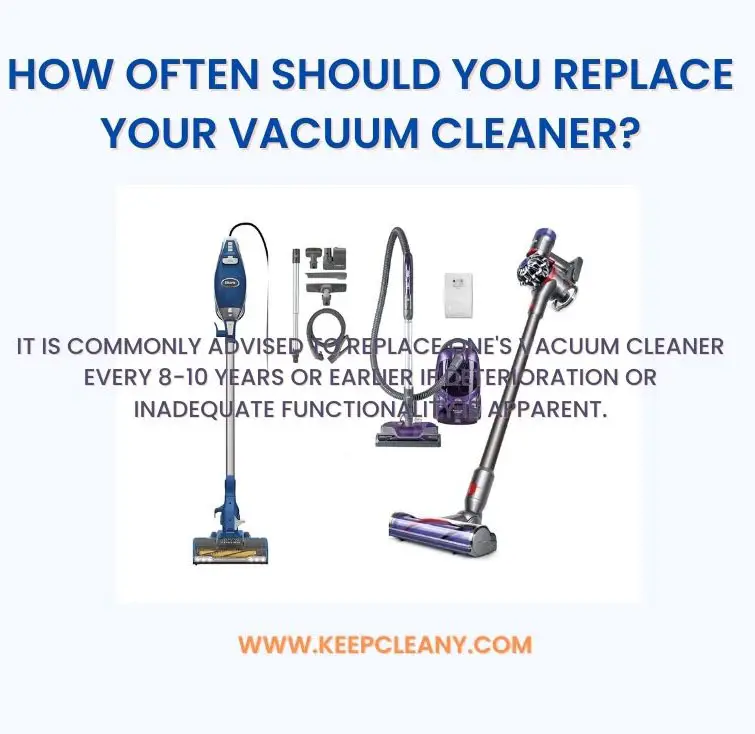Vacuum cleaners are an essential household appliance that helps keep our homes clean and healthy. But, have you ever wondered how often you should replace your vacuum cleaner? It’s a common question that many homeowners ask, and the answer may surprise you.
The lifespan of a vacuum cleaner depends on several factors, such as the frequency of use, the type of flooring you have, and the maintenance practices you follow. In this article, we’ll explore these factors in detail to help you determine how often you should replace your vacuum cleaner to keep your home clean and healthy. So, let’s get started!
It is recommended to replace your vacuum cleaner every 8-10 years. However, if you have pets or allergies, you may need to replace it more frequently, every 3-5 years. Signs that it is time to replace your vacuum include loss of suction power, strange noises, and an unpleasant odor. Regular maintenance, such as cleaning filters and replacing bags, can help prolong the life of your vacuum.

How Often Should You Replace Your Vacuum Cleaner?
Are you wondering how often you should replace your vacuum cleaner? The answer is not as straightforward as you might think. The lifespan of a vacuum cleaner depends on various factors such as the quality of the vacuum cleaner, how often it is used, and the type of flooring in your home. In this article, we will discuss the factors that determine the lifespan of a vacuum cleaner and how often you should replace it.
Factors that Determine the Lifespan of a Vacuum Cleaner
- Quality of the Vacuum Cleaner: The quality of the vacuum cleaner is a significant factor that affects its lifespan. High-quality vacuum cleaners last longer than low-quality ones. A high-end vacuum cleaner can last up to ten years, while a low-end vacuum cleaner may only last for a year or two.
- Frequency of Use: The frequency of use also plays a crucial role in determining the lifespan of a vacuum cleaner. If you use your vacuum cleaner daily or several times a week, it will wear out faster than a vacuum cleaner that is used less frequently.
- Type of Flooring: The type of flooring in your home also affects the lifespan of your vacuum cleaner. If you have hardwood or tiled floors, your vacuum cleaner will last longer than if you have carpets or rugs. Carpets and rugs put more wear and tear on the vacuum cleaner’s motor, which can shorten its lifespan.
If you have pets, the lifespan of your vacuum cleaner may also be shorter. Pet hair and dander can clog the vacuum cleaner’s filters and reduce its suction power, which can cause the motor to burn out faster.
Now that we know the factors that determine the lifespan of a vacuum cleaner let’s discuss how often you should replace it.
How Often Should You Replace Your Vacuum Cleaner?
- Replace Every 3-5 Years: On average, you should replace your vacuum cleaner every 3-5 years. If you have a high-quality vacuum cleaner and use it less frequently, it can last up to ten years. However, if you have a low-quality vacuum cleaner or use it frequently, you may need to replace it after just a year or two.
- Replace When it Loses Suction: If your vacuum cleaner loses suction power, it’s a sign that it’s time to replace it. A vacuum cleaner that doesn’t suction properly can’t clean your floors effectively, which defeats the purpose of having a vacuum cleaner in the first place.
- Replace When it Breaks: If your vacuum cleaner breaks down or needs frequent repairs, it’s time to replace it. Continuing to use a broken vacuum cleaner can be dangerous and can cause further damage to your floors.
Replacing your vacuum cleaner every 3-5 years may seem like a hassle, but it’s essential for keeping your floors clean and maintaining a healthy living environment. A new vacuum cleaner will have better suction power, which means it will clean your floors more effectively and remove more dirt and dust from your home.
The Benefits of Replacing Your Vacuum Cleaner
- Better Indoor Air Quality: A new vacuum cleaner will remove more dirt and dust from your home, which means better indoor air quality. This is especially important if you or anyone in your family suffers from allergies or respiratory problems.
- Improved Cleaning Performance: A new vacuum cleaner will have better suction power, which means it will clean your floors more effectively.
- Reduced Maintenance and Repair Costs: If you replace your vacuum cleaner before it breaks down, you’ll save money on maintenance and repair costs.
Vacuum Cleaner Types: Pros and Cons
| Type of Vacuum Cleaner | Pros | Cons |
|---|---|---|
| Upright Vacuum Cleaner | Powerful suction, easy to use, great for carpets | Heavy, bulky, can be difficult to maneuver around furniture |
| Canister Vacuum Cleaner | Lightweight, easy to maneuver, great for hard floors and upholstery | Not as effective on carpets, can be more expensive |
| Stick Vacuum Cleaner | Lightweight, easy to use, great for quick cleanups | Not as powerful as upright or canister vacuum cleaners, may not have attachments for upholstery or stairs |
Choosing the right type of vacuum cleaner for your home depends on your specific needs and preferences. If you have mostly carpeted floors, an upright vacuum cleaner may be the best choice. If you have hard floors and want a lightweight vacuum cleaner, a stick or canister vacuum cleaner may be a better option.
The Bottom Line
In conclusion, the lifespan of a vacuum cleaner depends on various factors such as its quality, frequency of use, and type of flooring in your home. On average, you should replace your vacuum cleaner every 3-5 years. Replacing your vacuum cleaner before it breaks down will save you money on maintenance and repair costs and improve the indoor air quality in your home. Choosing the right type of vacuum cleaner for your home depends on your specific needs and preferences.
Frequently Asked Questions
How often should you replace your vacuum cleaner?
It is recommended to replace your vacuum cleaner every 5-7 years. However, this timeframe can vary depending on how often you use your vacuum and how well you maintain it. If you have pets or allergies, you may need to replace your vacuum more frequently.
Additionally, if you notice that your vacuum is not picking up dirt and debris as well as it used to, or if it is making strange noises or emitting foul odors, it may be time to replace it. Investing in a new vacuum can improve the air quality in your home and make cleaning easier and more efficient.
What are some signs that it’s time to replace your vacuum cleaner?
There are several signs that it’s time to replace your vacuum cleaner. If your vacuum is no longer picking up dirt and debris effectively, it may be time for a new one. Other signs include strange noises, foul odors, or if the vacuum is overheating or shutting off unexpectedly.
If you have pets, allergies, or if you are noticing an increase in dust or allergens in your home, it may be time to upgrade to a newer, more powerful vacuum. Additionally, if your vacuum is more than 5-7 years old, it may be time to replace it for better performance and efficiency.
What factors should you consider when choosing a new vacuum cleaner?
When choosing a new vacuum cleaner, there are several factors to consider. First, consider your cleaning needs. Do you have pets or allergies? Do you need a vacuum for carpets or hard floors?
Next, consider the features you want, such as a HEPA filter, attachments for upholstery or stairs, and a bagless or bagged option. You should also consider the size and weight of the vacuum, as well as the noise level and cord length.
What are the benefits of upgrading to a newer vacuum cleaner?
Upgrading to a newer vacuum cleaner can provide several benefits. Newer models typically have more advanced features, such as HEPA filters, which can improve the air quality in your home. They also tend to be more powerful and efficient, making cleaning faster and easier.
Additionally, newer models may have specialized attachments for pet hair, upholstery, and stairs, making it easier to clean different surfaces in your home. Investing in a new vacuum cleaner can also save you money in the long run, as it will be more energy-efficient and require less maintenance.
How can you maintain your vacuum cleaner to ensure it lasts longer?
To ensure that your vacuum cleaner lasts as long as possible, it is important to maintain it properly. This includes regularly cleaning the filters, emptying the dustbin or replacing the bag, and regularly checking for and removing any blockages.
You should also clean the brush roll and replace it if it becomes worn or damaged. Additionally, make sure to store your vacuum in a dry, cool place and avoid overloading it or using it for purposes it was not intended for. Proper maintenance can extend the life of your vacuum cleaner and improve its performance.
When To Replace Your Vacuum Cleaner
In conclusion, it is important to replace your vacuum cleaner regularly to ensure optimal performance and efficiency. While there are no hard and fast rules, experts recommend replacing your vacuum every five to seven years, depending on usage and maintenance.
Regular maintenance, such as cleaning filters and replacing bags, can prolong the life of your vacuum cleaner. However, if you notice a decline in suction power or the vacuum starts to emit strange odors, it may be time to replace it.
Investing in a new vacuum cleaner can also provide several benefits, such as improved air quality, better cleaning performance, and increased energy efficiency. So, if you’re due for a replacement, it may be worth considering upgrading to a newer model.
Overall, keeping your vacuum cleaner in good condition and replacing it when necessary can help you maintain a clean and healthy home. Don’t hesitate to consult with a professional or do your own research to determine the best time to replace your vacuum cleaner.

